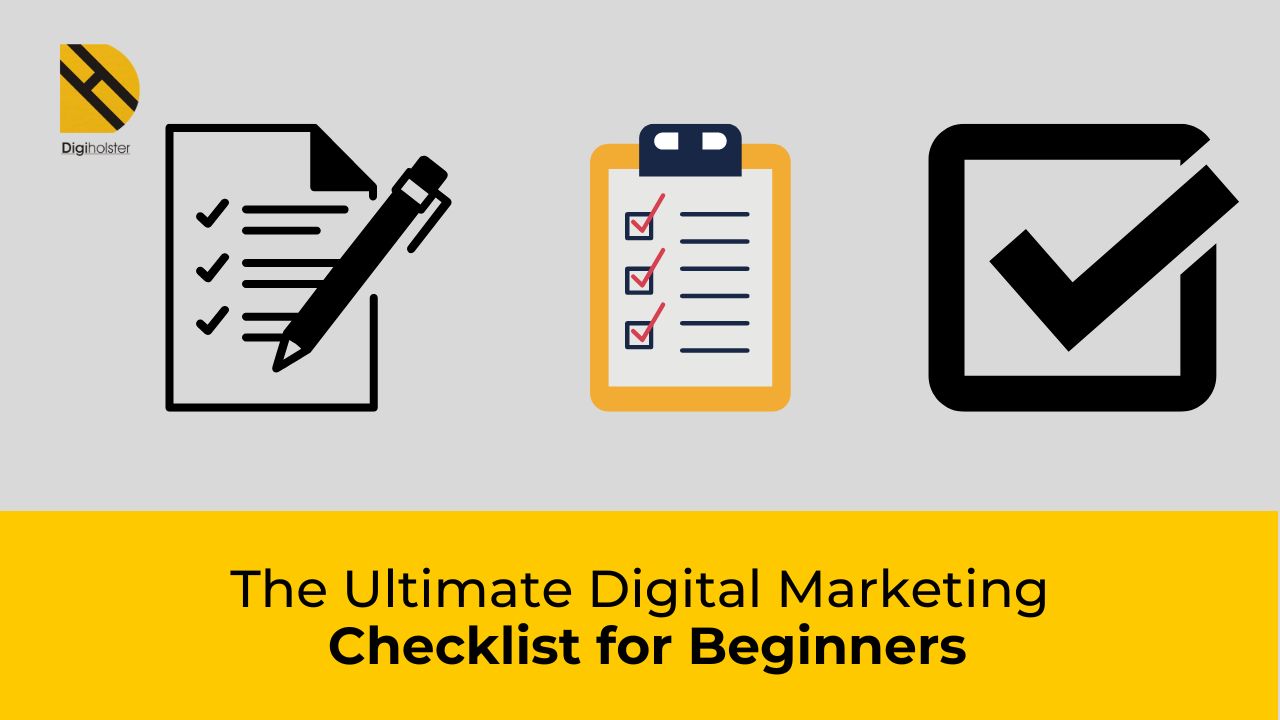
If you’re new to digital marketing, it can be overwhelming to navigate the many different channels and tactics available. With so many options, it can be difficult to know where to start or what strategies to prioritize. That’s why we’ve created the ultimate digital marketing checklist for beginners, which covers everything you need to know to get started.
Before we dive into the details, let’s define digital marketing. Digital marketing encompasses all marketing efforts that use electronic devices or the internet. This includes search engine optimization (SEO), social media marketing, email marketing, pay-per-click advertising, content marketing, and more.
Without further, let’s get started with the ultimate digital marketing checklist for beginners.
Set your goals and objectives
Before you dive into any digital marketing strategy, it’s essential to set your goals and objectives. Your goals will help you measure the success of your marketing efforts, so make sure they are specific, measurable, achievable, relevant, and time-bound (SMART). Whether you want to increase brand awareness, generate leads, or drive sales, make sure your goals align with your overall business objectives.
Identify your target audience
Your target audience is the group of people you want to reach with your marketing efforts. To identify your target audience, you need to understand their demographics, interests, behaviors, and pain points. Once you have a clear understanding of your target audience, you can tailor your marketing messages and tactics to better resonate with them.

Develop your buyer personas
Buyer personas are semi-fictional representations of your ideal customers. They help you understand your customers’ needs, motivations, and buying behaviors, so you can create more targeted and effective marketing campaigns. When developing your buyer personas, consider their demographics, psychographics, behavior patterns, goals, and pain points.
Conduct a website audit
Your website is the foundation of your digital marketing efforts. It’s essential to ensure that it’s optimized for both users and search engines. Conduct a website audit to identify any technical issues, such as broken links, slow page load times, and poor mobile optimization. Additionally, make sure your website has clear navigation, compelling calls-to-action, and relevant and engaging content.
Optimize your website for search engines
Search engine optimization (SEO) is the practice of optimizing your website to rank higher in search engine results pages (SERPs). To optimize your website for SEO, you need to conduct keyword research, optimize your meta tags, create high-quality and relevant content, and build quality backlinks. Additionally, make sure your website is mobile-friendly and has a fast page load speed.
Create valuable and engaging content
Content is the backbone of digital marketing. It helps you attract, engage, and convert your target audience. When creating content, make sure it’s valuable, informative, and engaging. Use different content formats, such as blog posts, videos, infographics, and social media posts, to reach your audience on different channels. Additionally, make sure your content is optimized for SEO, so it ranks higher in search engine results.
Leverage social media
Social media is a powerful tool for building brand awareness, engaging with your audience, and driving traffic to your website. Choose the social media platforms that align with your target audience and business objectives. When creating social media content, make sure it’s relevant, engaging, and visually appealing. Use social media analytics to measure your social media performance and optimize your social media strategy.
Launch email marketing campaigns
Email marketing is an effective way to nurture leads and build relationships with your audience. Use email marketing to share valuable content, promote your products or services, and drive traffic to your website. When launching email marketing campaigns, segment your email list, use attention-grabbing subject lines, and personalize your email content. Additionally, make sure your emails are optimized for mobile devices and comply with anti-spam laws.
Run pay-per-click (PPC) advertising campaigns
Pay-per-click advertising is a form of online advertising where you pay each time someone clicks on your ad. PPC advertising can help you reach your target audience quickly and drive traffic to your website. To run successful PPC campaigns, you need to choose the right keywords, write compelling ad copy, and optimize your landing pages.
Monitor and measure your results
Measuring your digital marketing results is crucial to understanding the effectiveness of your marketing campaigns. Use tools like Google Analytics, social media analytics, and email marketing analytics to track your performance metrics, such as website traffic, bounce rates, click-through rates, conversion rates, and revenue. Use your data to optimize your marketing strategies and achieve your business goals.

FAQs
What is the best digital marketing strategy for beginners?
The best digital marketing strategy for beginners depends on your business goals and target audience. However, we recommend starting with SEO and content marketing, as they can help you build a strong online presence and attract organic traffic to your website.
How long does it take to see results from digital marketing?
The time it takes to see results from digital marketing depends on various factors, such as the marketing channels you’re using, your competition, and your target audience. However, in general, you can start seeing results within a few weeks or months, but it may take up to six months or more to achieve significant results.
Do I need to hire a digital marketing agency?
Hiring a digital marketing agency can be beneficial if you don’t have the skills, resources, or time to manage your marketing campaigns. However, if you have a limited budget, you can also learn and implement digital marketing strategies on your own.
What is the difference between SEO and PPC?
SEO and PPC are two different digital marketing strategies. SEO involves optimizing your website to rank higher in search engine results pages (SERPs) organically, while PPC involves paying for ads to appear at the top of search engine results pages. Both strategies can help you drive traffic to your website, but they have different costs, benefits, and limitations.
How often should I update my website content?
Updating your website content regularly can help you attract and retain your audience and improve your search engine rankings. We recommend updating your website content at least once a month, but it depends on your business goals, the type of content you’re publishing, and your target audience’s preferences.
Article By DigiHolster
